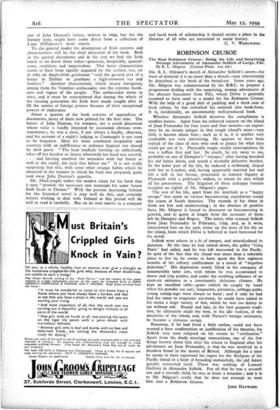ROBINSON CRUSOE
The Real Robinson Crusoe : Being the Life and Surprising Strange Adventures of Alexander Selkirk of Largo, Fife. By R. L. Megroz. (Cresset Press. 128. 6d.)
Ma. R. L. MEGRoz's sketch of Alexander Selkirk's career—for want of material it is no more than a sketch—may conveniently be described as the book of the broadcast. Some years ago, Mr. Megroz was commissioned by the B.B.C. to prepare a programme dealing with the surprising, strange adventures of the obscure buccaneer from Fife, whom Defoe is generally assumed to have used as a model for his Robinson Crusoe. With the help of a good deal of padding and a thick coat of local colour, he has reworked his material into book-form. It is, incidentally, an uncommonly well-produced book.
Whether Alexander Selkirk deserves the compliment is another matter. Apart from his enforced sojourn on the island of Juan Fernandez for four years and four months—an experi- ence by no means unique in that rough island's story—very little is known about him ; such as it is, it is neither very creditable nor very interesting. He appears to have been typical of the class of men who took to piracy for what they could get out of it. Physically tough, totally unscrupulous, he was a ruffian first and last. In youth, he ran away to sea, probably on one of Dampier's " voyages," after having knocked his old father down, and struck a mentally defective brother. In the latter part of his life, he seduced a milkmaid, eloped with her to London, and, having apparently married her and left a will in her favour, proceeded to commit bigamy at Plymouth with a publican's widow, to whom he also willed all his possessions. The litigation of these unhappy females occupies an eighth of Mr. Megroz's pages.
The rest of his life, apart from the interlude as a " happy savage," was spent on various buccaneering expeditions round the coasts of South America. The records of his share in them are few and uninteresting ; in the absence of positive facts, Mr. Megroz is forced to discourse on buccaneering in general, and to quote at length from the accounts of them. left by Dampier and Rogers. The latter, who rescued Selkirk from Juan Fernandez in February, 1709, and, as it were, interviewed him on the spot, wrote up the story of his life on the island, from which Defoe is believed to have borrowed for his noveL
Selkirk went ashore in a fit of temper, and miscalculated its duration. By the time he had cooled down, the galley Cinq Ports' had sailed, and he was left marooned in the Pacific. In spite of the fact that the island was more than a tolerable place to live in, he seems to have spent the first eighteen months of his solitary confinement in a mood of "hopeless dejection." His depression slowly lifted in the company of innumerable tame cats, with whom he was accustomed to dance and sing psalms, and under the soothing influence of an open-air existence in a consistently delicious climate. He kept an excellent table—goats (which he caught by hand when his powder ran out), langoustes, pimentos, cabbage-palm, young turnip-tops were always to hand ; and if only he had had the sense to evaporate sea-water, he could have added to his menu a large variety of fish, which he was to dainty to eat without salt. Stupid and lazy, in the best gangster tradi- tion, he ultimately made the best, in his idle fashion, of the amenities of the island, and, with Nature's benign assistance, he became a virtuous savage.
Rousseau, if he had lived a little earlier, could not have wanted a finer confirmation or justification of his theories, for Selkirk very soon relapsed on his return to " civilisation." Apart from his shady marriage transactions, one of the few things known about him after his return to England after his adventures on Juan Fernandez, is that he was involved in a drunken brawl in the streets of Bristol. Although for a time he seems to have expressed his regret for the fleshpots of his Pacific island in a kind of brooding melancholy, the 91d Adam quickly reasserted itself. There was nothing of Lemuel Gulliver in Alexander Selkirk. For all that he was a seventh son and a seventh child, he was at heart a bounder ; and it is to Mr. Megroz's credit that he does not attempt to turn him into a Robinson Crusoe,
JOHN HAYWARD.


















































 Previous page
Previous page